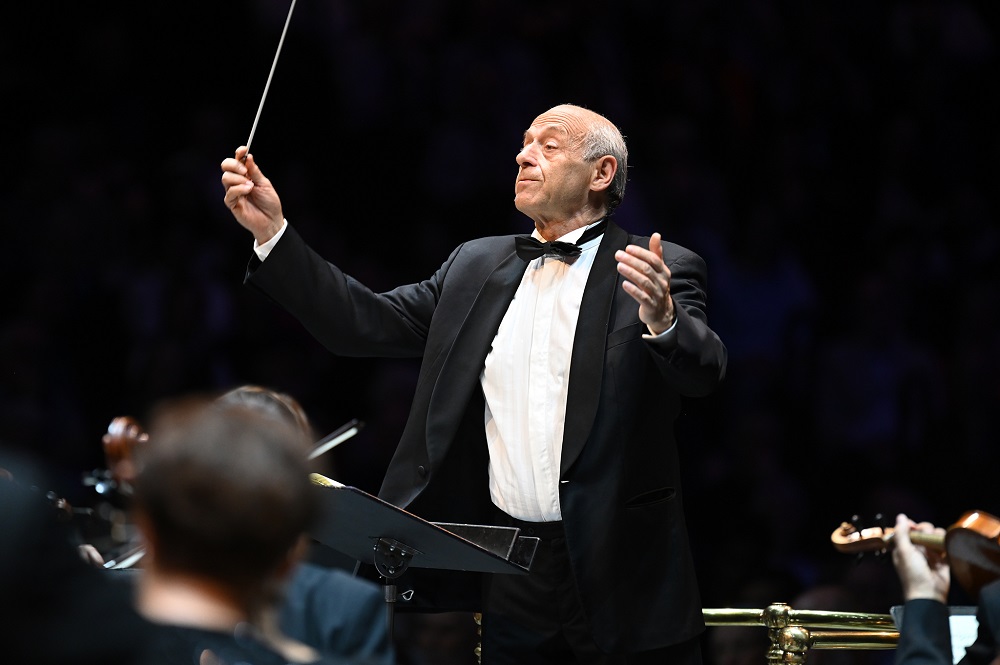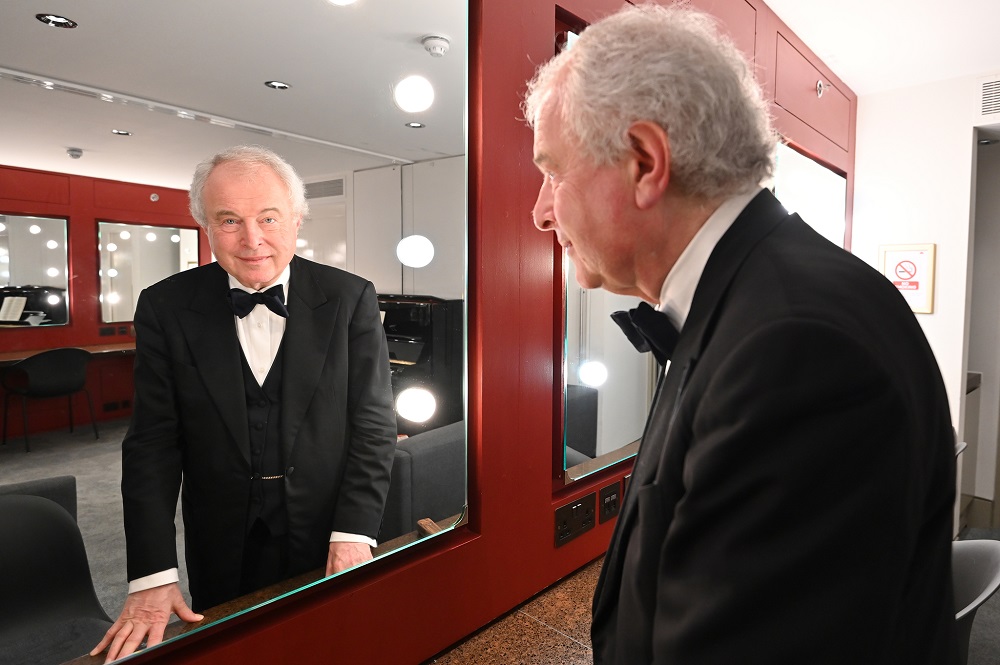Prom 39: Schiff, Elbert, Budapest Festival Orchestra, Fischer 3 review - jaw-dropping standards of orchestral playing | reviews, news & interviews
Prom 39: Schiff, Elbert, Budapest Festival Orchestra, Fischer 3 review - jaw-dropping standards of orchestral playing
Prom 39: Schiff, Elbert, Budapest Festival Orchestra, Fischer 3 review - jaw-dropping standards of orchestral playing
Openness, renewal and optimism in Ligeti, Bartók and Beethoven
The Budapest Festival Orchestra never stops proving what a great ensemble it is. In last night’s concert, the third Prom of its weekend residency, the miraculous ways in which the absurd humour of Ligeti, the deep soulfulness of Bartók and the implacable genius of Beethoven were brought to the surface were not just joyful and completely fulfilling, but also unfailingly drew in the attention of the whole audience in a completely full Royal Albert Hall.
It takes quite some performance to overcome the seeming familiarity of Beethoven’s Eroica, and yet Iván Fischer and his Budapest orchestra achieved it. The power and the clarity of every gesture from the conductor are astonishing. Sometimes he sways from side to side to reinforce the feeling of the dance, at others he will stand stock-still, glower and confront. As he admits in the programme note: “I’m a terrible tyrant when I conduct...” He might give the first violins the shape of a phrase with a long arc, or give them a repeated figure by appearing to be shaking something off his hand. Or he will leans into the violas to bring lustre and love to a melody. One can hear how every one those gestures becomes reflected in the music. 
The wind section never ceases to amaze with the impeccable way they play “across” as a section. Perhaps this is related to the fact that the orchestra’s Montpellier-born principal oboe Victor Aviat is also a conductor in his own right, and one with a growing reputation.
From the Bartók Third Concerto, which the same team performer in Edinburgh, what stays above all in the mind is the wondrously unhurried spaciousness and poetry of the slow movement, a feeling reinforced by listening to the excellent radio recording. Never a moment of grandstanding, pointscoring or overemphasising, András Schiff, approaching 70 later this year (and pictured below backstage), consistently gave this work crispness and natural clarity – and inspiring authority. His encore, No.1 from Three Rondos on Slovak Folk Tunes by Bartók written in 1916 also had grace and beautiful poise. 
The piece is true to Iván Fischer’s credo that he wants to test limits in the orchestra, to treat it as a “laboratory for the future. Indeed, there are always surprises: whereas this programme might have appeared on paper as the most Hungarian of the three, this “Hungarian” orchestra had a fine guest leader, Korean-German violinist Suyoen Kim who s leader of the Konzerthausorchester Berlin. One of the greatest challenge for orchestras is to make room for the energies and talents of the players of extraordinary quality who, having emerged from European conservatoires and academies in the past twenty years.. and who are now in their prime. The presence of Kim leading this fine orchestra felt like the right gesture of openness, renewal and optimism.
rating
Explore topics
Share this article
more Classical music
 Classical CDs: Swans, hamlets and bossa nova
A promising young pianist's debut disc, plus Finnish mythology and a trio of neglected British composers
Classical CDs: Swans, hamlets and bossa nova
A promising young pianist's debut disc, plus Finnish mythology and a trio of neglected British composers
 Christian Pierre La Marca, Yaman Okur, St Martin-in-The-Fields review - engagingly subversive pairing falls short
A collaboration between a cellist and a breakdancer doesn't achieve lift off
Christian Pierre La Marca, Yaman Okur, St Martin-in-The-Fields review - engagingly subversive pairing falls short
A collaboration between a cellist and a breakdancer doesn't achieve lift off
 Ridout, Włoszczowska, Crawford, Lai, Posner, Wigmore Hall review - electrifying teamwork
High-voltage Mozart and Schoenberg, blended Brahms, in a fascinating programme
Ridout, Włoszczowska, Crawford, Lai, Posner, Wigmore Hall review - electrifying teamwork
High-voltage Mozart and Schoenberg, blended Brahms, in a fascinating programme
 Sabine Devieilhe, Mathieu Pordoy, Wigmore Hall review - enchantment in Mozart and Strauss
Leading French soprano shines beyond diva excess
Sabine Devieilhe, Mathieu Pordoy, Wigmore Hall review - enchantment in Mozart and Strauss
Leading French soprano shines beyond diva excess
 Špaček, BBC Philharmonic, Bihlmaier, Bridgewater Hall, Manchester review - three flavours of Vienna
Close attention, careful balancing, flowing phrasing and clear contrast
Špaček, BBC Philharmonic, Bihlmaier, Bridgewater Hall, Manchester review - three flavours of Vienna
Close attention, careful balancing, flowing phrasing and clear contrast
 Watts, BBC Symphony Orchestra and Chorus, Bignamini, Barbican review - blazing French masterpieces
Poulenc’s Gloria and Berlioz’s 'Symphonie fantastique' on fire
Watts, BBC Symphony Orchestra and Chorus, Bignamini, Barbican review - blazing French masterpieces
Poulenc’s Gloria and Berlioz’s 'Symphonie fantastique' on fire
 Bell, Perahia, ASMF Chamber Ensemble, Wigmore Hall review - joy in teamwork
A great pianist re-emerges in Schumann, but Beamish and Mendelssohn take the palm
Bell, Perahia, ASMF Chamber Ensemble, Wigmore Hall review - joy in teamwork
A great pianist re-emerges in Schumann, but Beamish and Mendelssohn take the palm
 First Persons: composers Colin Alexander and Héloïse Werner on fantasy in guided improvisation
On five new works allowing an element of freedom in the performance
First Persons: composers Colin Alexander and Héloïse Werner on fantasy in guided improvisation
On five new works allowing an element of freedom in the performance
 First Person: Leeds Lieder Festival director and pianist Joseph Middleton on a beloved organisation back from the brink
Arts Council funding restored after the blow of 2023, new paths are being forged
First Person: Leeds Lieder Festival director and pianist Joseph Middleton on a beloved organisation back from the brink
Arts Council funding restored after the blow of 2023, new paths are being forged
 Classical CDs: Nymphs, magots and buckgoats
Epic symphonies, popular music from 17th century London and an engrossing tribute to a great Spanish pianist
Classical CDs: Nymphs, magots and buckgoats
Epic symphonies, popular music from 17th century London and an engrossing tribute to a great Spanish pianist
 Sheku Kanneh-Mason, Philharmonia Chorus, RPO, Petrenko, RFH review - poetic cello, blazing chorus
Atmospheric Elgar and Weinberg, but Rachmaninov's 'The Bells' takes the palm
Sheku Kanneh-Mason, Philharmonia Chorus, RPO, Petrenko, RFH review - poetic cello, blazing chorus
Atmospheric Elgar and Weinberg, but Rachmaninov's 'The Bells' takes the palm
 Daphnis et Chloé, Tenebrae, LSO, Pappano, Barbican review - lighting up Ravel’s ‘choreographic symphony’
All details outstanding in the lavish canvas of a giant masterpiece
Daphnis et Chloé, Tenebrae, LSO, Pappano, Barbican review - lighting up Ravel’s ‘choreographic symphony’
All details outstanding in the lavish canvas of a giant masterpiece

Add comment